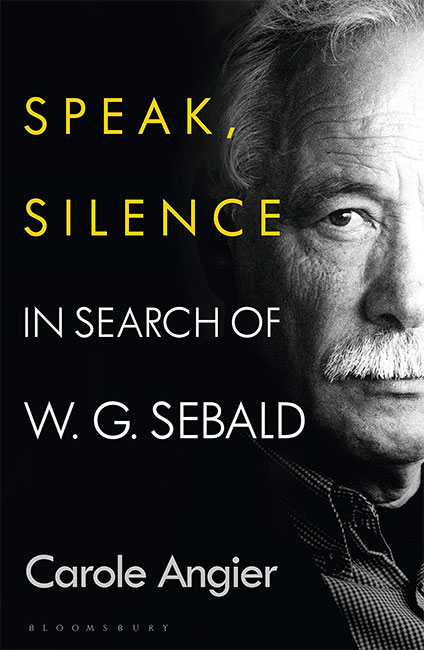
Speak, Silence. In Search of W.G. Sebald, Carole Angier (617pp, £30, hbck, Bloomsbury)
Carole Angier is obsessive, a literary terrier who will never put the ball down to be thrown again. Denied interviews and information by many of W.G. Sebald’s closest family, friends and colleagues, she nevertheless persists in tracking down and interviewing every and any contact she can, revisiting cities and towns in England, Germany and Switzerland, and reading all the letters, manuscripts and archives she finds.
This is, of course, what biographers do. What they don’t so often do is have a thesis or argument they subsume their biography too. Here, Angier’s obsession is Sebald’s nationalistic ‘guilt’ (and hatred of) his country’s Nazi past and its denial of it, and his depression. Throughout the book, however, Angier has to make assumptions and guesses about how Sebald felt and how it all feeds into his writing.
It’s not, of course, that Sebald’s books aren’t melancholic and depressive, they are well known as discursive and gloomy exploratory texts. But they aren’t autobiography, or anything close, and Angier knows full well that she is on thin ice when she persists in seeing endless links between ‘real’ events and occurrences and the contents of Sebald’s books. All writers are somehow present in their work, all writers steal and adapt stories and experiences from others, and Sebald was no different.
Or perhaps he was? One of the problems with this book, apart from the surmises throughout, is that it is so closely focussed on Sebald that it does not offer a wider literary context for his work. One of the reasons that Sebald was so popular a writer is that his books were published as creative non-fiction was becoming a best-selling genre and publishing hotspot. Psychogeography and fictional biography were just two of the types of book that contributed to this rise, and Sebald was and is often associated both of these. Literary debates raged, and continue still, about the blurring of fact and fiction, and the ownership of stories; sampling and remixing don’t just happen in popular music!
It seems to me that this context is entirely missing from Angier’s biography, yet it would be more useful for the reader than some of the psychological assumptions and biographical details here. At times this book falls back on convoluted links between biographical details about Sebald and his books, occasionally noting that a certain fact wasn’t true, he altered the date or changed the colour of her hair, which of course is what writers do! But it is a biography, whose focus is the named subject, although for me it strays too far from the books, which after all is what Sebald is famous for, and the only reason anyone would read his biography.
This may be my problem of course. I came late to Sebald and after four attempts over a decade have still not made it through Rings of Saturn, though I have read his poetry and his other books. I am not very knowledgeable about German culture or widely read in European literature, but I am interested in Sebald’s literary influences, and how he saw himself as a writer; even the process of how he wrote. I am not, however, at all interested in where he lived, what he had for breakfast or how ill he was feeling at any given moment.
The repression of individual and cultural memory, inherited guilt and melancholy are all fascinating subjects, and much has been written about them. There is no question that these subjects underpin Sebald’s writing, often more specifically in relation to Germany and the Holocaust, but Angier never truly unpicks these themes in her biography: they are here only through biographical moments, such as Sebald’s first shock encounter with concentration camp footage at school. Angier uses words like ‘trauma’ throughout her book, and relies on her categorisations and labels, rather than the books themselves, as evidence for why Sebald wrote what he did.
There is no question that Sebald is an accomplished and fascinating writer, albeit too erudite and mannered for many readers; nor that Angier is a studious and thorough biographer. Much of this book however feels like conjecture, and also highly constructed to fit Angier’s point of view, especially her late sideways step where she suggests that Sebald is totally original and actually writes about metaphysics and the true nature of reality. Despite copious and detailed footnotes for each point, I can’t help but feel there is another Sebald out there, an author who is not quite the one Angier creates. I’d rather like to meet him.
Rupert Loydell
